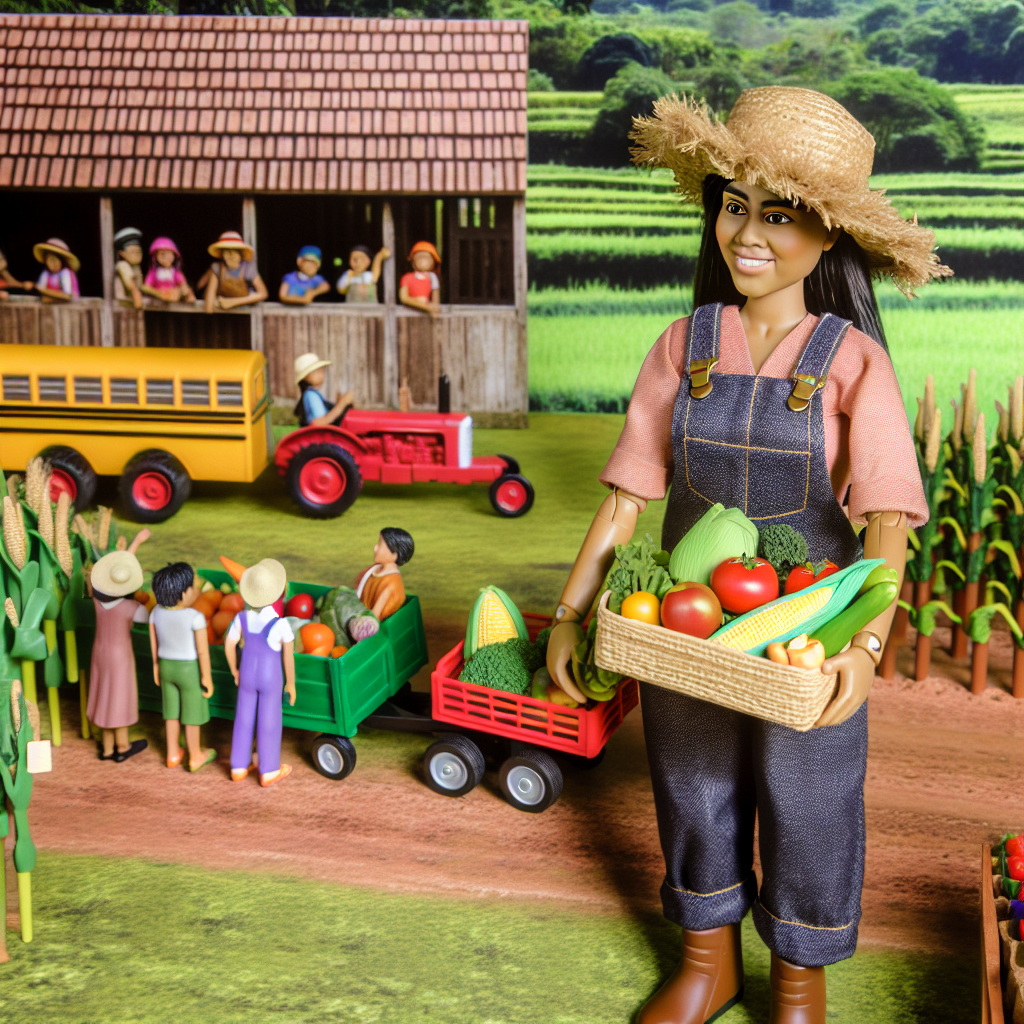Introduction to Farm-to-School Programs
Farm-to-school programs connect local farms to schools.
These initiatives promote healthy eating habits among students.
They enhance the diversity of school meals by incorporating fresh produce.
Additionally, they support local agricultural economies.
Farm-to-school programs also educate children about food sources.
Consequently, these programs foster an appreciation for local agriculture.
They aim to create sustainable food systems within communities.
This collaboration benefits farmers, schools, and students alike.
Definition of Farm-to-School Programs
Farm-to-school programs provide farm-fresh foods to school cafeterias.
They often include nutrition education components for students.
Furthermore, these programs promote hands-on learning through garden activities.
Schools partner with local farmers to supply seasonal produce.
Importance of Farm-to-School Programs
These programs play a vital role in improving public health.
They combat childhood obesity by promoting nutritious options.
Moreover, farm-to-school initiatives can improve local economies.
Transform Your Agribusiness
Unlock your farm's potential with expert advice tailored to your needs. Get actionable steps that drive real results.
Get StartedThey create stable markets for local produce.
Consequently, these partnerships strengthen the community’s food system.
In addition, they foster relationships between students and food producers.
As a result, children become more conscious consumers.
Overview of Successful Farm-to-School Partnerships
Introduction to Farm-to-School Initiatives
Farm-to-school programs actively connect farmers with local schools.
These initiatives encourage the use of locally sourced produce in school meals.
They also promote agricultural education for students.
As a result, these partnerships benefit farmers and help nourish future generations.
Success Story: Green Valley Farms
Green Valley Farms implemented a robust farm-to-school program.
They partnered with Hilltop Elementary School in Springfield.
The school now features seasonal produce in its cafeteria menus.
This collaboration increased local vegetable sales by 30% in one year.
Students, in turn, learned the importance of healthy eating habits.
Success Story: Fresh Harvest Co-Op
Fresh Harvest Co-Op joined hands with Riverdale High School.
They introduced a weekly farmers’ market at the school.
Families and students can purchase fresh, organic produce directly from farmers.
Feedback from students highlighted a newfound appreciation for local food.
Moreover, the initiative improved parents’ engagement in school activities.
Success Story: Sunny Acres Agricultural Education Program
Sunny Acres launched an educational program focused on sustainable farming.
They collaborated with Maple Leaf School District to create a school garden.
This hands-on experience taught students about planting and harvesting.
As a result, students became more aware of where their food comes from.
Additionally, the program fostered teamwork and responsibility among participants.
Impact of Farm-to-School Programs
Farm-to-school partnerships create a positive impact on communities.
Showcase Your Farming Business
Publish your professional farming services profile on our blog for a one-time fee of $200 and reach a dedicated audience of farmers and agribusiness owners.
Publish Your ProfileThey help boost the local economy by supporting small farmers.
Schools benefit from fresher food, leading to healthier meal options.
Students develop healthier eating habits through exposure to fresh produce.
Ultimately, these programs cultivate a stronger connection between education and agriculture.
Economic Benefits for Farmers
Increased Sales from Local Markets
Farm-to-school programs enhance farmers’ sales opportunities.
Participating in these programs allows farmers to directly supply schools.
This connection increases the demand for local produce.
As a result, farmers experience higher revenue streams.
Moreover, farmers build long-term relationships with schools.
These relationships foster consistent purchasing patterns.
Consequently, stability in income enables better planning.
Support from the Community
Farm-to-school initiatives strengthen community ties.
When farmers supply schools, they gain local visibility.
This visibility translates into community support.
Families appreciate and prioritize local sourcing.
Additionally, local endorsement boosts farmers’ reputations.
Farmers become known as trusted community members.
Such trust often leads to repeat business from families.
Participatory Opportunities for Growth
Farmers benefit from collaborative efforts in education.
Working with schools allows for hands-on learning experiences.
These experiences increase awareness of agricultural practices.
Further, participants can showcase their unique products.
This involvement creates opportunities for brand expansion.
Farmers may also find new markets beyond the school system.
Consequently, they can diversify product offerings.
You Might Also Like: Promoting Your Farm with Local Food Sourcing
Nutritional Impact on Students: Healthier Meal Options and Education
The Importance of Nutritious Meals
Nutritious meals are crucial for students’ overall health and well-being.
They contribute to better physical and cognitive development.
Research shows that children who eat healthy meals perform better academically.
Consequently, schools are prioritizing access to fresh, local foods.
Farm-to-School Initiatives
Farm-to-school programs connect local farmers with schools.
These initiatives provide fresh produce to the cafeteria.
Students enjoy fruits and vegetables that are in season.
Moreover, this supports local agriculture and economies.
Enhancing Nutrition Education
Nutritional education empowers students to make healthy choices.
Farm-to-school programs often incorporate lessons about local foods.
Students learn where their food comes from and its impact on health.
Hands-on activities, like cooking classes, reinforce this knowledge.
Real-Life Success Stories
Many school districts have successfully implemented these programs.
For instance, Maplewood School District reported increased fruit consumption.
Showcase Your Farming Business
Publish your professional farming services profile on our blog for a one-time fee of $200 and reach a dedicated audience of farmers and agribusiness owners.
Publish Your ProfileStudents participated in tasting events that highlighted local produce.
Such experiences foster a love for healthy foods among children.
Community Involvement
Community support enhances farm-to-school programs.
Local organizations often volunteer to assist in educational activities.
This collaboration brings awareness about healthy eating to families.
As a result, entire communities benefit from better nutritional habits.
Long-Term Health Benefits
Investing in nutritional meals today leads to healthier futures.
Students who develop healthy eating habits are less prone to obesity.
Furthermore, they are likely to continue these habits into adulthood.
Thus, farm-to-school programs play a vital role in public health.
Explore Further: Building Trust With Ethical Farming
Sustainability and Environmental Stewardship
Reducing Carbon Footprint
Farm-to-school programs play a pivotal role in sustainability.
They connect local farmers with nearby schools, reducing transportation emissions.
By sourcing food locally, schools decrease their carbon footprint significantly.
Local sourcing enhances freshness and nutritional quality for students.
Farmers benefit from stable demand, promoting sustainable farming practices.
Supporting Local Economies
These programs invigorate local economies by keeping money within communities.
Farmers gain access to new markets, increasing their economic resilience.
Schools procure food from local farms, fostering beneficial partnerships.
In turn, these collaborations promote environmental stewardship across the community.
Promoting Biodiversity
Sustainable practices enhance biodiversity in local agriculture.
Farmers often adopt diverse crops, enriching the local ecosystem.
Schools can introduce students to a variety of foods, teaching appreciation for nature.
This education cultivates the next generation of environmentally conscious citizens.
Utilizing Sustainable Practices
Farmers can implement practices that reduce resource use and waste.
Techniques include crop rotation and reduced pesticide use.
These methods lead to healthier soils and ecosystems.
Schools can promote these practices through educational programs.
Encouraging Healthy Habits
Connecting students to local food sources fosters healthy eating habits.
Students learn about nutrition and the importance of local food systems.
These practices can lead to long-term health benefits for children.
Moreover, awareness about environmental issues increases among students.
Gain More Insights: Building Strong Farm and School Partnerships

Challenges Faced by Farmers in Farm-to-School Programs
Understanding the Barriers
Farmers encounter several barriers when participating in farm-to-school programs.
These challenges include logistical issues and market access hurdles.
Additionally, the lack of consistent demand can create uncertainty for farmers.
Moreover, regulatory requirements can be complex and overwhelming.
Farmers often struggle with understanding the specific needs of school cafeterias.
Furthermore, communication gaps between farmers and schools can lead to missed opportunities.
Logistical Challenges
Transportation remains a major logistical challenge for farmers.
Showcase Your Farming Business
Publish your professional farming services profile on our blog for a one-time fee of $200 and reach a dedicated audience of farmers and agribusiness owners.
Publish Your ProfileFarmers must deliver fresh produce promptly to maintain quality.
Moreover, inadequate infrastructure can complicate the delivery process.
Rural locations often exacerbate these issues due to distance.
Thus, coordination between logistics companies and farmers is essential.
Market Access Issues
Many farmers find it hard to access the school market.
They often lack information about school procurement processes.
Furthermore, they may not have existing contracts with local schools.
Consequently, forming relationships with school districts is crucial.
Building these relationships requires time and persistence.
Regulatory Requirements
Navigating regulatory requirements can be daunting for farmers.
Farm-to-school programs often involve strict food safety regulations.
Farmers need to meet specific standards to sell to schools.
Training and resources on compliance are essential for success.
Therefore, extending support services for farmers can help alleviate these burdens.
Solutions and Insights
Various solutions can help farmers overcome these challenges.
Collaboration with local organizations can provide critical support.
For example, mentorship programs can assist in forming school partnerships.
Additionally, flexible delivery schedules can accommodate farmers’ capabilities.
Utilizing technology can streamline communication between farmers and schools.
Moreover, workshops on regulatory requirements can empower farmers.
Leveraging Local Networks
Farmers can benefit from connecting with local food networks.
These networks often provide valuable resources and information.
Networking with other successful farmers can inspire new strategies.
Furthermore, local farms can collaborate to fulfill bulk orders for schools.
Building Sustainable Partnerships
Establishing strong relationships with schools fosters sustainability.
Open communication can help both parties understand each other’s needs.
Farmers should participate in school events to enhance visibility.
Engaging with students can also create enthusiasm for local food.
These efforts can ultimately lead to more consistent demand for their products.
Uncover the Details: Companion Planting Ideas for Small-Scale Gardens
Community Engagement: Building Relationships between Farmers and Schools
The Importance of Strong Connections
Creating strong relationships between farmers and schools is vital.
These connections enhance student learning and local economies.
Furthermore, they foster community support for local agriculture.
Strategies for Effective Engagement
Farmers can engage with schools through various methods.
Hosting farm tours allows students to experience agriculture firsthand.
Additionally, farmers can participate in school events and fairs.
Sharing their expertise in classrooms enriches educational programs.
Collaborative Projects and Programs
Implementing farm-to-school programs promotes local produce.
These initiatives provide fresh food options for school lunches.
Collaboration can extend to gardening projects and nutrition education.
Showcase Your Farming Business
Publish your professional farming services profile on our blog for a one-time fee of $200 and reach a dedicated audience of farmers and agribusiness owners.
Publish Your ProfileFarmers can work alongside teachers to create hands-on learning opportunities.
Building Trust and Communication
Effective communication strengthens the bond between farmers and schools.
Regular updates about farm activities keep schools informed.
Feedback from schools helps farmers understand community needs.
Both parties should prioritize transparency and mutual respect.
Success Stories that Inspire
Several schools have successfully implemented farm-to-school programs.
For instance, Pine Valley School partners with local farmers.
They provide fresh produce, leading to healthier meal options.
Moreover, this collaboration has increased students’ interest in agriculture.
Measuring the Impact
Evaluating the effectiveness of these initiatives is crucial.
Schools can track student participation and health improvements.
Farmers can assess increased demand for local products.
Collecting data helps refine and enhance future programs.
Case Studies: Highlighting Successful Local Farmers and Their Stories
The Impact of Local Produce
Local farmers contribute significantly to their communities.
They provide fresh produce to schools and local markets.
This helps nourish children and promotes healthy eating.
Moreover, it supports local economies and creates jobs.
Highlighting Farmer Profiles
Meet Sarah Jensen, a dedicated organic farmer from Greenfield.
She started her farm three years ago.
Now, she supplies fresh vegetables to five local schools.
Her produce has received rave reviews from students and teachers alike.
Next, we introduce Tom Rivera from Sunny Acres Farm.
Tom specializes in strawberries and blueberries.
His farm collaborates with several school districts.
This partnership enhances student access to healthy snacks.
Strategies for Success
Farmers leverage several successful strategies in their operations.
- Building strong relationships with local schools.
- Participating in farm-to-school programs.
- Engaging in community events to increase visibility.
These strategies create lasting partnerships and trust.
Challenges Faced by Farmers
Local farmers encounter various challenges in this journey.
Weather variability often impacts crop yields.
Market access can also be a significant hurdle.
Additionally, logistics and transportation pose challenges.
Lessons Learned
Farmers learn valuable lessons along their journey.
Adaptability is key in the ever-changing agricultural landscape.
Networking with other farmers enhances collective knowledge.
Finally, listening to schools helps tailor offerings to their needs.
Additional Resources
DATCP Home Farm to School & Institution
Local Food Systems: Concepts, Impacts, and Issues, ERR 97, US …




